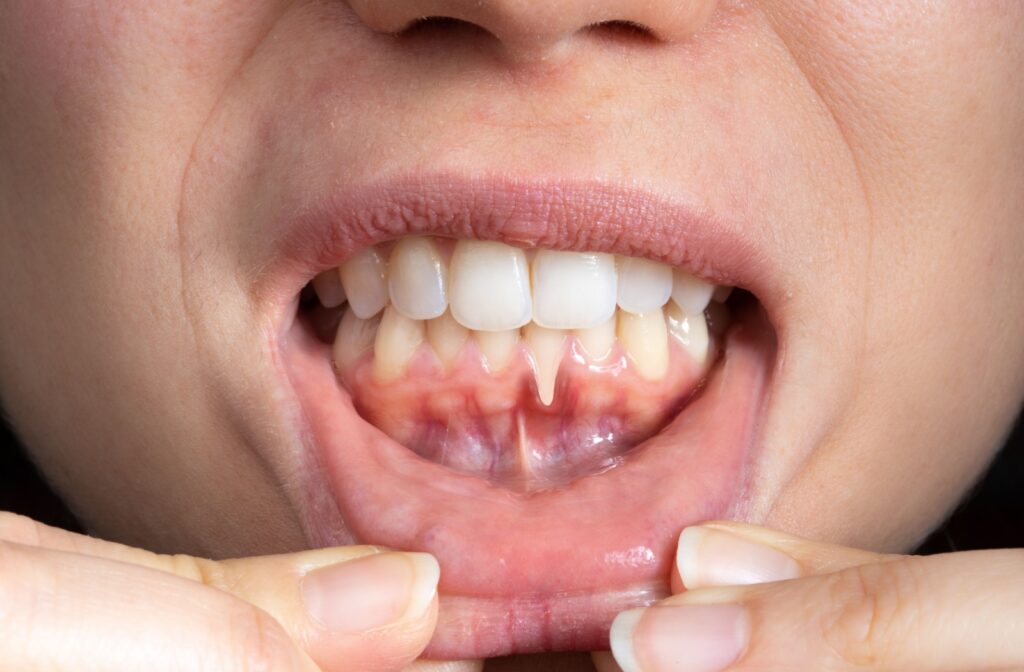Receding gums are a common dental concern that can lead to sensitivity, tooth decay, and even tooth loss if left untreated. To stop receding gums, improve your oral hygiene, visit your dentist regularly, and consider professional treatments like deep cleaning, gum grafting, or laser therapy. Addressing the issue early is key to protecting your smile. For more information on maintaining healthy gums, check out our dental services and what we offer to transform your smile.
What Are Receding Gums?
Receding gums occur when the gum tissue surrounding the teeth pulls back, exposing more of the tooth or its root. This can create gaps, allowing bacteria to accumulate and causing further damage. Left untreated, gum recession can lead to significant oral health issues.
What Causes Receding Gums?
Understanding the causes of gum recession is the first step in preventing and stopping it. Common factors include:
- Poor oral hygiene: Inadequate brushing and flossing can lead to plaque buildup, which irritates and inflames the gums.
- Aggressive brushing: Brushing too hard or using a hard-bristled toothbrush can wear down gum tissue over time.
- Gum disease: Periodontal disease is one of the leading causes of receding gums.
- Genetics: Some people are more prone to gum recession due to their genetic makeup.
- Smoking and tobacco use: Tobacco products can damage gum tissue and hinder its ability to heal.
- Teeth grinding (bruxism): Chronic grinding or clenching can put excessive pressure on the teeth which can lead to damage of the supporting structure and cause bone loss and recession. Night guards can be very helpful in these cases.
How to Stop Receding Gums
Stopping gum recession requires a combination of preventive measures, lifestyle changes, and professional dental care.
Maintain Proper Oral Hygiene
A good oral hygiene routine is the foundation for healthy gums.
- Brush twice a day using a soft-bristled toothbrush and fluoride toothpaste.
- Floss daily to remove plaque and food particles between teeth.
- Use an antibacterial mouthwash to reduce bacteria that cause gum disease.
Visit Your Dentist Regularly
Regular dental checkups are essential for monitoring gum health and addressing issues early. Your dentist can recommend treatments or adjustments to your oral care routine if signs of gum recession appear.
Use the Right Brushing Technique
Avoid brushing too hard or with a scrubbing motion. Instead, use gentle circular movements, focusing on the gumline. If you’re unsure about your technique, ask your dentist or hygienist for guidance.
Quit Smoking
Tobacco use weakens gum tissue and contributes to inflammation, making it harder for gums to heal. Quitting smoking is one of the best things you can do for your oral and overall health.
Wear a Night Guard
If you grind or clench your teeth, a custom-made night guard can protect your teeth and gums from excessive pressure and damage.
Address Underlying Health Issues
Conditions like diabetes or hormonal changes can impact gum health. Work with your healthcare provider to manage these conditions effectively.

Professional Treatments for Receding Gums
In addition to at-home care, your dentist may recommend professional treatments to stop gum recession and restore gum health.
Scaling and Root Planing (Deep Cleaning)
This procedure removes plaque and tartar from below the gumline and smooths the tooth roots to prevent bacteria buildup. It’s an effective treatment for early gum disease and mild recession.
Gum Grafting
For more advanced cases, a gum graft may be necessary. This surgical procedure involves taking tissue from another part of your mouth or using donor tissue to cover exposed roots, protecting the teeth and improving the appearance of your gums.
Pinhole Surgical Technique (PST)
This minimally invasive procedure involves repositioning existing gum tissue to cover exposed roots. PST requires no sutures and has a shorter recovery time compared to traditional gum grafting.
Laser Therapy
Lasers can be used to remove diseased tissue, reduce bacteria, and stimulate gum regeneration. Laser therapy is less invasive and promotes faster healing.
Can Receding Gums Grow Back?
Unfortunately, gum tissue doesn’t regenerate once it has receded. However, professional treatments can restore coverage over exposed roots and prevent further recession. Early intervention is crucial to preserving gum health and avoiding complications.
How to Prevent Gum Recession
Preventing gum recession is always better than treating it. Here are some tips to keep your gums healthy:
- Brush and floss daily to remove plaque and prevent gum disease.
- Use a soft-bristled toothbrush and avoid aggressive brushing.
- Replace your toothbrush every three months or sooner if the bristles are frayed.
- Schedule regular dental cleanings and checkups.
- Avoid tobacco products and limit alcohol consumption.
- Eat a balanced diet rich in vitamins and minerals that support gum health, like vitamin C and calcium.
When to See a Dentist
If you notice any of the following signs, it’s time to schedule a dental appointment:
- Sensitivity to hot, cold, or sweet foods.
- Gums that appear red, swollen, or bleed easily.
- Teeth that look longer due to exposed roots.
- Persistent bad breath or a bad taste in your mouth.
- Loose teeth or noticeable gaps between teeth and gums.
At Kensington Dental Care, we’re dedicated to helping you maintain healthy gums and a beautiful smile. Whether you’re dealing with gum recession or want to prevent it, our team is here to provide expert care. Schedule an appointment today to learn more about how we can help you achieve healthy oral health.
Protect Your Gums for a Healthy Smile
Stopping receding gums is possible with the right combination of daily care and professional treatment. By maintaining good oral hygiene, visiting your dentist regularly, and addressing any underlying causes, you can protect your gums and preserve your smile for years to come. Don’t wait—contact Kensington Dental Care to start your journey to healthier gums today!










